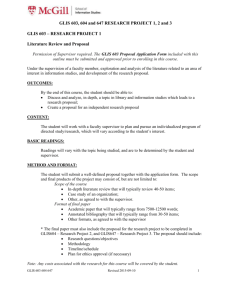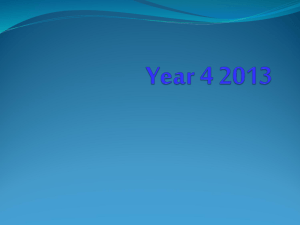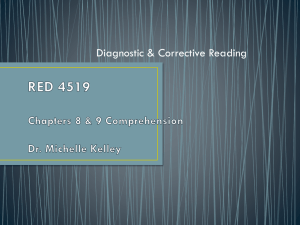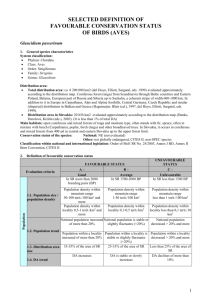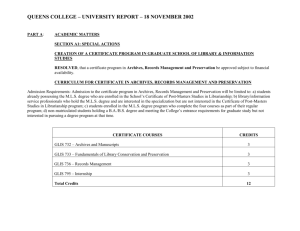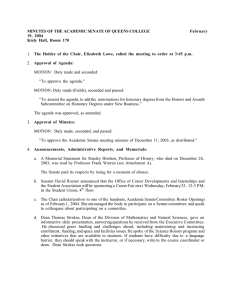MINUTES OF THE ACADEMIC SENATE OF QUEENS COLLEGE MAY 1, 2008
advertisement
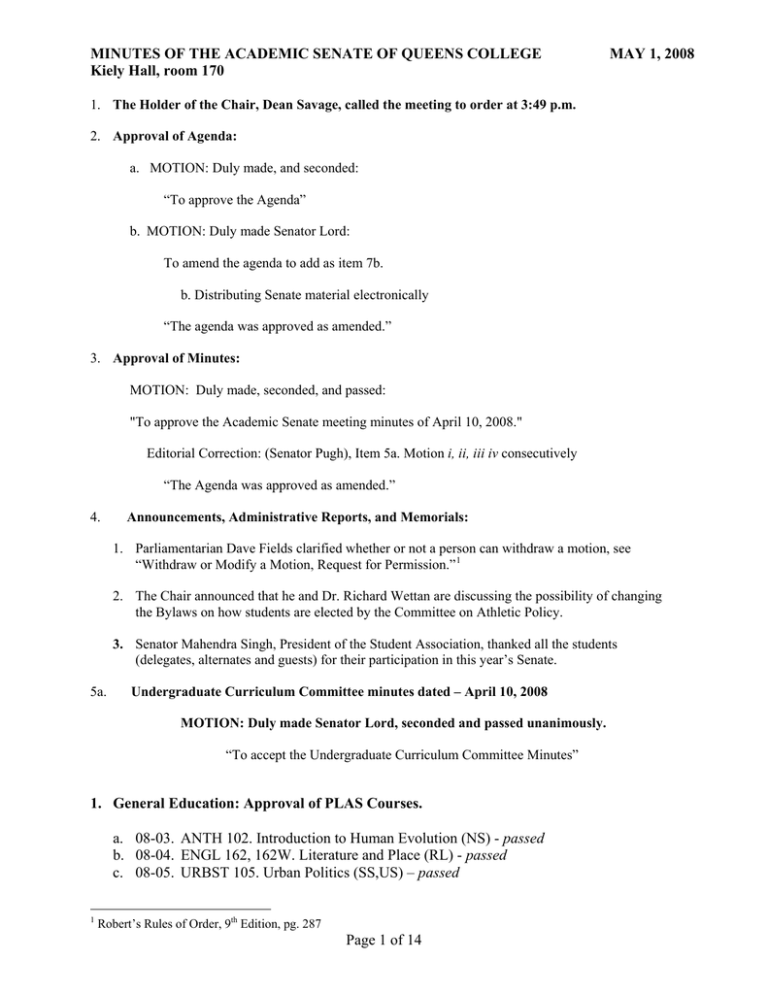
MINUTES OF THE ACADEMIC SENATE OF QUEENS COLLEGE
Kiely Hall, room 170
MAY 1, 2008
1. The Holder of the Chair, Dean Savage, called the meeting to order at 3:49 p.m.
2. Approval of Agenda:
a. MOTION: Duly made, and seconded:
“To approve the Agenda”
b. MOTION: Duly made Senator Lord:
To amend the agenda to add as item 7b.
b. Distributing Senate material electronically
“The agenda was approved as amended.”
3. Approval of Minutes:
MOTION: Duly made, seconded, and passed:
"To approve the Academic Senate meeting minutes of April 10, 2008."
Editorial Correction: (Senator Pugh), Item 5a. Motion i, ii, iii iv consecutively
“The Agenda was approved as amended.”
4.
Announcements, Administrative Reports, and Memorials:
1. Parliamentarian Dave Fields clarified whether or not a person can withdraw a motion, see
“Withdraw or Modify a Motion, Request for Permission.” 1
2. The Chair announced that he and Dr. Richard Wettan are discussing the possibility of changing
the Bylaws on how students are elected by the Committee on Athletic Policy.
3. Senator Mahendra Singh, President of the Student Association, thanked all the students
(delegates, alternates and guests) for their participation in this year’s Senate.
5a.
Undergraduate Curriculum Committee minutes dated – April 10, 2008
MOTION: Duly made Senator Lord, seconded and passed unanimously.
“To accept the Undergraduate Curriculum Committee Minutes”
1. General Education: Approval of PLAS Courses.
a. 08-03. ANTH 102. Introduction to Human Evolution (NS) - passed
b. 08-04. ENGL 162, 162W. Literature and Place (RL) - passed
c. 08-05. URBST 105. Urban Politics (SS,US) – passed
1
Robert’s Rules of Order, 9th Edition, pg. 287
Page 1 of 14
Academic Senate Minutes -May 1, 2008
(5a. Undergraduate Committee Minutes continued)
Completed proposals may be found on the UCC website,
www.qc.cuny.edu/AcademicSenate/UCC
2. Urban Studies (08-07)
a. Change in Description: To read:
URBST 141. Introduction to Urban Planning.
3 hr.; 3 cr.
An introduction to theoretical, methodological, and practical issues involved in social and
physical planning for urban areas. It will include issues such as attracting economic
development, the siting of public services and facilities, and the regulation and placement of
housing.
b. Change in description: To read:
URBST 200. Methods in Urban Research.
3 hr.; 3 cr. Prereq.: Any 6 credits in anthropology, economics, political science, sociology, or
urban studies.
Introduction to the range of methodological approaches used in urban-related research. These
include macroscopic analysis, demography, survey research, historical research, institutional
analysis, participant observation, community studies, policy analysis, and evaluation
research. Emphasis is placed on the development of critical skills at reading, interpreting, and
analyzing social science research, whether this research is encountered in textbooks and
lectures, in professional journals, or in the popular media. (Not open to students who have
taken SOC 212 and 334. For urban studies majors and minors who have taken these two
courses, the requirement of URBST 200 will be waived.) (SQ)
3. Computer Science (08-10)
a. New course
CSCI 066. Computer Applications for Prospective Mathematics Teachers.
2 hr. lec, 2 hr. lab; 3 cr. Prereq.: Admission to the TIME 2000 program.
Hands-on introduction to computing geared toward aiding mathematics teachers both
administratively and academically. Computer terminology, computer math, operating
systems, web page creation, Internet research, word processing, spreadsheets, database
management, mathematics software, computer programming and networking are all part of
the experience. Strengthening problem solving/programming skills and preparing pupils to
cope with changing computer environments are major goals.
4. Classical, Middle Eastern & Asian Languages & Cultures
Discussion:The four Chinese courses described here are an integral part of the new major in Chinese. (The
Letter of Intent for this major was approved at the February 14, 2008 meeting of the Academic Senate and is
currently working its way through the CUNY-wide review process. All of these courses are listed there as well.)
These courses assume a high level of ability in Chinese, and all require Chinese 204 (or its equivalent) as a
prerequisite.
Page 2 of 14
Academic Senate Minutes -May 1, 2008
(5a. Undergraduate Committee Minutes continued)
a. New course.
CHIN 314 Chinese Grammar, Rhetoric, and Composition
3 hr.; 3cr. Prereq.: CHIN 204, or permission of the department.
A review of Chinese grammar and usage based on close readings of essays together with
systematic practice in composition.
b. New course.
CHIN 315 Writing Modern Chinese
3 hr.; 3cr. Prereq.: CHIN 204 or equivalent.
Practice in writing Modern Chinese. Study of the formal structure of different types of
writing, based on reading and composition. Particular forms to be studied may include
essays, poetry, short stories, scholarly writing, newspaper articles.
c. New course.
CHIN 317 Introduction to Formal Chinese Linguistics
3 hr.; 3cr. Prereq.: CHIN 204, or permission of the department. Chinese 317 and 318 may
be taken in either order. An introduction to topics in formal Chinese linguistics including the
syntax, semantics, phonology, morphology, and lexicon of Chinese. The language of
instruction is Chinese. Readings and assignments will be in English and Chinese.
d. New Course.
CHIN 318 Introduction to Applied Chinese Linguistics
3 hr.; 3cr. Prereq.: CHIN 204, or permission of the department. Chinese 317 and 318 may
be taken in either order.
An introduction to topics in applied Chinese linguistics including sociolinguistics, dialects,
stylistics, language variation and change, and history of Chinese. The language of
instruction is Chinese. Readings and assignments will be in English and Chinese.
e. New Course
East Asian Studies 209. VT: Structure of an East Asian Language
3 hr.; 3cr.
An introduction to the significant grammatical and linguistic features of a language (or
language family) spoken in East Asia. Writing systems, history, and language change will be
addressed where appropriate. The language of instruction is English and no prior language
studied is required. May be repeated once for credit if the two languages studied are not in
the same language family.
5b.
Graduate Curriculum Committee Minutes dated – April 2, 2008
a. MOTION: Duly made Steven Schwarz:
To remove Item #4, SEYS-762
b. MOTION: Duly made Steven Schwarz seconded and passed unanimously.
Page 3 of 14
Academic Senate Minutes -May 1, 2008
(5b.Graduate Committee Minutes continued)
“To approve Graduate Curriculum Committee Minutes as amended”
NOTE: Items 1 & 2 were approved at the 3/5/08 Graduate meeting.
1.
Secondary Education and Youth Services (G08-10)
Change in requirements for degree/certificate: [X]
Initial Certificate Program Requirements (Queens College Graduate Bulletin, 2004-2006, No.
41, page 78)
To Read:
Students must hold a bachelor’s degree with a major (or equivalent) in the subject area in which
they wish to be certified. Students who were not subject area majors but have a minimum of 21
appropriate credits in the content area may be accepted but are required to complete at least 15
content area credits before they are recommended for initial certification. These 15 credits will be
selected with the approval of the major advisor. Students who have more than 21 subject-area
credits but fewer than 36 will be required to make up the corresponding number of missing credits.
In all cases, the Advisor will ensure that the distribution of the 36 subject-area credits is appropriate
to the requirements of certification in the student’s major area. Students are also required to have
one year of college study, or its equivalent, in a language other than English, except for students
who major in a foreign language. They must also meet the general admissions requirements for
graduate study at Queens College, including a cumulative and departmental average of at least B
(3.0) to remain in the program. Following fulfillment of the Initial Certificate program (21 credits),
students may complete the remaining graduate courses required for the Master of Science in
Education degree in Secondary Education (between 15 to 18 credits in education and 15 credits in
the content area), which will lead to professional certification. In order to be recommended for
Initial certification through the college, students must earn a minimum of a B grade in student
teaching.
2.
Secondary Education and Youth Services (G08-11)
Change in course prerequisite or corequisite and course description:
To Read:
SEYS 570.4–574.4. Student Teaching in ________for Secondary School. 280 hr.
of daily participation for 15 weeks at a secondary school; 4 cr. Prereq.: Permission
of the department, including a minimum grade of B in the methods course (SEYS 360-364) and a
minimum average GPA of 3.0 in all SEYS courses: SEYS 536, 552, and 570.2-574.2; coreq.: SEYS
580-584. School-based teaching experiences are provided that prepare student teachers to
effectively teach students at the secondary school levels. Under the guidance of a cooperating
teacher and a college-based supervisor, students are expected to teach at least one 9th-grade class
and one higher grade class. In order to be recommended for Initial certification through the college,
students must earn a minimum of a B grade in student teaching.
3.
Computer Science (G08-08)
CSCI 688. Advanced Productivity Tools for Business. 2 hr. lec. 2 hr. lab.; 3 cr. Prereq.: CSCI 012
or equivalent.
Computing technology for students in business and finance-related disciplines. Advanced analytic
techniques with an emphasis on spreadsheet topics such as financial functions and formulas, pivot
Page 4 of 14
Academic Senate Minutes -May 1, 2008
(5b.Graduate Committee Minutes continued)
tables, charting, and macro programming. Integration of spreadsheets, databases, and
presentation tools for analysis and report generation.
4.
Secondary Education and Youth Services (G08-09) (withdrawn)
5.
Accounting (G08-012)
New Course
Accounting 601. Financial Accounting Theory and Practice – Part 2.
4 hr.; 4 cr. Pprereq.: Accounting 600.
Second required course for students having an undergraduate degree in other than accounting,
wishing to enter the Master of Science in Accounting Program at Queens College. This course
continues the intensive study of the theories of financial accounting, generally accepted accounting
principles, and relevant opinions and statements of the American Institute of Certified Public
Accountants, Financial Accounting Standards Board, and the Securities and Exchange Commission.
It also involves mathematical principles and applications thereof to accounting.
6.
Accounting (G08-013)
New course
Accounting 602. Financial Accounting Theory and Practice-Part 3
3 hr.; 3 cr. Prereq.: Accounting 601.
Theory of accounting applicable to problems peculiar to large-scale business operations, including
the problems of accounting for mergers, insolvencies, branch operations, liquidations and the
preparation of consolidated financial reports. Relevant opinions of the American Institute of
Certified Public Accountants, Financial Accounting Standards Board, and the Securities and
Exchange Commission
7.
Accounting (G08-014)
New Course
Accounting 604 Concepts of Auditing and Computer Auditing
4 hr.; 4 cr. Prereq.: Accounting 601; Corequisite: Accounting 602.
Auditing and other forms of assurance services applicable to the accounting profession. Auditing
procedures, including applications to computerized systems; test of internal controls and
substantive audit procedures performed by CPAs. Introduction to statistical sampling applicable to
audit engagements. Review of relevant pronouncements of American Institute of Certified Public
Accountants, Securities and Exchange Commission and Public Accounting Oversight Board as well
as ethical standards expected of CPAs.
8.
Accounting (G08-015)
New course
Accounting 600. Financial Accounting Theory and Practice – Part 1.
4 hr.; 4 cr. Prereq.: matriculation in MS Accounting Bridge Program.
First required course for students having an undergraduate degree in other than accounting, wishing to
enter the Master of Science in Accounting Program at Queens College. This course provides the
fundamental understanding of the language of business as expressed in financial reports. It continues
into an intensive study of the theories of financial accounting, generally accepted accounting principles,
and relevant opinions and statements of the American Institute of Certified Public Accountants,
Financial Accounting Standards Board, and the Securities and Exchange Commission.
Page 5 of 14
Academic Senate Minutes -May 1, 2008
(5b.Graduate Committee Minutes continued)
9.
Accounting (G08-016)
New Course
Accounting 603 Concepts of Managerial Accounting.
4 hr.; 4 cr. Prereq.: Accounting 601.
The concepts and procedures used to account for the cost of manufacturing and selling, with their
practical application in different types of cost accumulation systems (for example job-order,
standard and process costing). The application of various techniques in managerial decisionmaking, inventory management, capital budgeting, and capital investment decisions.
Rationale The purpose of this course is to provide an accelerated learning experience into managerial accounting for
students with no prior background in accounting in their undergraduate degree.
10.
Accounting (G08-017)
New Course
Accounting 605. Introduction to Business Law.
4 hr.; 4 cr.
Introduction to key concepts of business law including contracts, agency, forms of business
organization, personal and real property and employment and elder law. The basic structure through
which law is implemented and enforced is reviewed.
11.
Accounting (G08-018)
New Course
Accounting 606. Federal and New York State Taxes on Income.
4 hr.; 4 cr. Prereq.: Accounting 600.
An introduction to the federal and state income taxes as they relate to individuals. This accelerated
course will emphasize the basic multitiered tax structure. Inclusion, exclusion, and deduction are
defined, utilizing the Internal Revenue Code and related material. Special classes of taxpayers
including partnerships and corporations are considered as well as accounting and procedural rules.
12.
Accounting (G08-019)
Change in requirements for admission: x]
Change in requirements for degree/certificate: [x]
HEGIS number 0502.00 ,To Read:
Chair: Israel Blumenfrucht
Graduate Program Directors: Neal B. Hitzig, Marvin F. Milich
Dept. Offices: Powdermaker Hall 215, (718) 997-5070
The Master of Science Program in Accounting is certified by the New York State Education
Department under HEGIS Code 0502.00. This 30-credit program provides advanced education in
Accounting and related areas so that the student completing the program (following a suitable
undergraduate program in Accounting or completion of the MS Accounting Bridge Program ) will
meet the fundamental requirements for taking the Uniform CPA Examination in New York State.
Further, students successfully completing the program will be well prepared for careers in public,
private, or governmental accounting, or for the teaching of accountancy in secondary schools. The
Queens College MS in Accounting builds upon successful completion of an undergraduate program
in Accounting or completion of the MS Accounting Bridge Program for students not having an
Page 6 of 14
Academic Senate Minutes -May 1, 2008
(5b.Graduate Committee Minutes continued)
undergraduate degree in accounting. In addition to the technically oriented courses in Accounting
and Economics, the Queens College MS Accounting Program allows a set of elective courses
outside the technical areas, in liberal arts disciplines, that provide a broader background for the
professional accountant.
Faculty
Blumenfrucht, Israel, Chair, Professor, PhD 1981, New York University, CPA: Taxation
Milich, Marvin F., Graduate Program Director, Associate Professor, JD 1971, New York
University School of Law, CPA: Law
Hitzig, Neal B., Graduate Program Director, Professor, PhD 1985, City University of New York,
CPA: Auditing, Financial Accounting
Adelberg, Arthur H., Professor, PhD 1977, City University of New York, CPA: Managerial
Accounting
Dauber, Nicky A., Lecturer, MS 1982, C.W. Post Institute of Finance, CPA: Auditing
David, Amy B., Lecturer, MS 2006, Queens College, CPA: Financial Accounting
Davidovits, Murray, Lecturer, JD 1983, New York University School of Law: Law
Erlach, David, Lecturer, PhD 1997, University of San Jose, JD, Hofstra University: Financial
Accounting
Hornung, David, Lecturer, MBA 1975, Baruch College: Financial Accounting
Leibowicz, Barry, Associate Professor, LLM 1973, New York University School of Law, CPA:
Taxation
Levine, Marc H. Professor, PhD 1983, Yeshiva University, CPA: Financial Accounting
Milo, Michael, Lecturer, MS 1983, Long Island University: Managerial Accounting
Qureshi, Anique, Professor, PhD 1993, Rutgers University, CPA: Managerial Accounting
Satenstein, Jeffrey, Lecturer, MS 1974, New York University, CPA: Financial Accounting
Siegel, Joel, Professor, PhD 1977, City University of New York, CPA: Financial Accounting
Simon, Abraham J., Professor, PhD 1971, University of Pennsylvania, CPA: Financial Accounting,
Government Accounting
Solieri, Steven A., Assistant Professor: PhD 2000, Binghamton University, CPA: Auditing
Stevens, Michael, Assistant Professor, LLM 1990, New York University School of Law, CPA:
Taxation
Walker, John P., Professor, PhD 1976, University of Cincinnati, CPA: Auditing
MASTER OF SCIENCE PROGRAM
Requirements for Matriculation into the MS in Accounting Program (for students having an
undergraduate degree in accounting)
These requirements are in addition to the general requirements for admission.
1.
An undergraduate degree (BA or BS) in accounting from an accredited college or university.
2.
Students should have earned an overall GPA of at least 3.0 in their undergraduate program, as
well as a GPA of at least 3.0 in their undergraduate accounting courses.
3.
GMAT (may be waived under certain circumstances; consult Graduate Program Director).
Alternative Requirements for Matriculation into the MS Accounting Bridge Program (for
students having an undergraduate degree in other than accounting)
These requirements are in addition to the general requirements for admission.
1.
An undergraduate degree (BA or BS) from an accredited college or university in other than
accounting.
Page 7 of 14
Academic Senate Minutes -May 1, 2008
(5b.Graduate Committee Minutes continued)
2.
3.
Students should have earned an overall GPA of at least 3.0.
GMAT.
The MS Accounting Bridge Program- Students subject to the alternative requirements for
matriculation are required to complete the following graduate coursework. At the discretion of the
Graduate Program Director, the number of graduate MS Accounting Bridge Program courses may
be reduced for previously completed equivalent undergraduate coursework.
Accounting 600 Financial Accounting Theory and Practice-Part 1
Accounting 601 Financial Accounting Theory and Practice-Part 2
Accounting 602 Financial Accounting Theory and Practice-Part 3
Accounting 603 Concepts of Managerial Accounting
Accounting 604 Concepts of Auditing and Computer Auditing
Accounting 605 Introduction to Business Law
Accounting 606 Federal and New York State Taxes on Income
Economics 601 Introduction to Micro and Macro Economics
Economics 602 Introduction to Corporate Finance and Money and Banking
Economics 649 Statistics as Applied to Economics and Business
Computer Science 688 Advanced Productivity Tools for Business
Successful completion of the alternative requirements for matriculation requires an overall GPA of
3.0 or higher in the MS Accounting Bridge Program. Once this is achieved, a student is
automatically matriculated into the 30 credit MS in Accounting Program.
Courses in the MS Accounting Bridge Program must be taken in the appropriate sequence,
satisfying all prerequisites. The following is an example of such a sequence for a student attending
part time in the evening:
Program Sequence
MS Accounting Bridge Program
Fall- first year
Accounting 600 Financial Accounting Theory and Practice-Part 1
Accounting 605 Introduction to Business Law
Economics 601 Introduction to Micro and Macro Economics
credits
4
4
4
Spring-first year
Accounting 601 Financial Accounting Theory and Practice-Part 2
Computer Science 688
Economics 602 Introduction to Corporate Finance and Money and Banking
4
3
4
Fall- second year
Accounting 602 Financial Theory and Practice- Part 3
Accounting 603 Concepts of Managerial Accounting
3
4
Spring-second year
Accounting 606 Federal and New York State Taxes on Income
4
Economics 649 Statistics as Applied to Economics and Business
3
TOTAL
41
Students who have completed equivalent undergraduate coursework may have certain of the above
courses waived, reducing the time for completion of the MS Accounting Bridge Program.
Page 8 of 14
Academic Senate Minutes -May 1, 2008
(5b.Graduate Committee Minutes continued)
Requirements for the Master of Science Degree
Students must complete at least 30 graduate credits in addition to completion of the MS Accounting
Bridge Program for those students subject to the alternative requirements for matriculation, with a
minimum GPA of 3.0. Students must also successfully complete a comprehensive accounting
examination, which may be retaken once in the event of initial failure. The 30 graduate course
credits include:
a)
The seven required courses (21 credits) in Accounting:
Accounting 712. Advanced Financial Accounting Theory
Accounting 723. Advanced Auditing Theory and Practice
Accounting 747. Communications and Accountants
Accounting 748. Advanced Accounting Information Systems (students who have received credit
for at least two undergraduate or graduate computer science or information systems courses are
exempt from Accounting 748, and may substitute an elective from (d) below).
Accounting 752. Advanced Studies in Business Law (students who have received equivalent
undergraduate credit must substitute an elective from (d) below).
Accounting 757. Taxation of Business Entities
Accounting 773. Government and Not-For-Profit Accounting and Auditing (students who have
received equivalent undergraduate credit must substitute an elective from (d) below).
b)
The two required courses (6 credits) in Economics:
Economics 703. Price & Distribution Theory
Economics 715. Corporate Finance
c)
One course (3 credits) from the following set of Economics courses (students who have taken
Economics 382 or its equivalent are exempt from this requirement and must choose an additional 3
credit course from (d) below):
Economics 705. Mathematical Economics
Economics 721. Econometrics
Economics 726. Introduction to Operations Research
d)
The following elective classes are available to students who have satisfied one or more of the ten
required courses through their previous undergraduate or graduate coursework:
Accounting 707.
Contemporary Issues in Management Accounting
Accounting 751.
Public Interest Law
Accounting 758.
State and Local Taxation
Accounting 759.
Estate and Gift Taxation and Administration
Computer Science 688 Advanced Productivity Tools for Business
Economics 711.
Money and Capital Markets
Economics 750.
Industrial Organization and Control
Economics 770.
Urban Economics: Tools, Methodology, and Applications
History 774.
History of American Business
Philosophy 760.
Business Ethics
Political Science 640.Public Administration
Political Science 715.Organization Theory
Psychology 754.
Behavioral Science and Business
Sociology 716.
Professional Writing and Communication for Social Research
Sociology 728.
Sociology of Organizations and Industry
Urban Studies 727. Public Management
Urban Studies 742. Public Budgeting
Page 9 of 14
Academic Senate Minutes -May 1, 2008
(5b.Graduate Committee Minutes continued)
13.
Economics (G08-020)
New Course
Economics 602. Introduction to Corporate Finance and Money and Banking.
4 hr.; 4 cr. Prereq.: Economics 601 or equivalent.
Principles of banking and financial economics. Topics include interest rates, financial markets,
financial institutions, the money supply and monetary policy, and how the financial system operates
in a macroeconomy.
14.
Economics (G08-021)
New Course
Economics 601 Introduction to Micro and Macro Economics.
4 hr.; 4 cr. Prereq.: Math 131 OR equivalent
Principles of microeconomics and macroeconomics. Analysis of the economy as a distinctive whole
that is also composed of multiple small parts. Critical examination of economic theories and
policies, especially as they are used by government officials to shape and guide the economy.
.
15.
Economics (G08-022)
New Course
Economics 649. Statistics as Applied to Economics and Business.
3 hr. plus 1 Lab. Hr.; 3 Cr. Prereq.: Economics 601 or equivalent, and Math 131 or equivalent.
Descriptive statistics, elementary probability theory, sampling statistical inference, estimation,
correlation and regression. Statistical applications will be on business and economics-related
topics.
16.
Graduate School of Library and Information Studies (G08-023)
New Courses Approved by the Graduate Curriculum Committee
GSLIS 706 Advanced Technological Concepts. 3 hrs.; 3 cr.
This hybrid online course will introduce the student to advanced levels of the conceptual and
practical elements of visual and computer literacy for the library and information science
profession. Online laboratory sessions and exercises will give students the opportunity to begin to
apply some of the concepts learned in class to reinforce and strengthen basic skills.
GSLIS 746. Design and Construction of Bibliographic Databases. 3 hr.; 3 cr. Pre/ Co-requisites:
GSLIS 700
This course examines the basic principles, elements and concepts of design, implementation and
utilization of bibliographic databases using a database management systems (DBMS) approach.
The course examines various data models and several database models for bibliographic data (i.e.
records of information bearing entities with necessary attributes of bibliographic data and subject
representation). Administrative tasks in the bibliographic database management environment are
also addressed.
GSLIS 748. Web Programming. 3 hrs.; 3 cr. Pre/Co-req.: GSLIS 700, GSLIS 751, Instructor’s
Permission.
This course examines the basic principles, elements, and concepts of design, writing, debugging
and implementation of programmatic utilities in a distributive environment i.e. the Internet. The
focus is on problem solving and learning to design web programs that are readable, well
documented, efficient and correct. The emphasis of the course is digital library applications.
Page 10 of 14
Academic Senate Minutes -May 1, 2008
(5b.Graduate Committee Minutes continued)
GSLIS 754. Human-Computer Interaction. 3 hr.; 3 cr. Pre/Co-Req.: GSLIS 700, GSLIS, 701,
GSLIS 703.
This course will introduce students to the fundamental principles of human-computer interaction
(HCI) with a strong focus on understanding the nature of how people interact with, or avoid,
computer technology; the problems they encounter in these interactions, and the design principles
that address the tactics used in making computers more usable and effective to a wide variety of
people, including children, the elderly, the handicapped and other special populations.
GSLIS 756. Managing New Technologies. 3 hr.; 3 cr. Pre/Co-req.: GSLIS 700, GSLIS 701,
GSLIS 702, GSLIS 703.
This course will introduce students to the administration of digital and multimedia resources
(software, hardware, peripherals, tools and services) in libraries, with an emphasis on strategic
planning and change management. Other issues addressed will include funding, staffing, training
issues, evaluation, selection, accessibility and intellectual property issues relating to new
technologies. There will be a practical focus on technology grant writing. Current and developing
uses of emerging technologies (e.g. Web 2.0, Library 2.0) in libraries and information centers will
be discussed and demonstrated.
GSLIS 757. Introduction to Digital Imaging. 3 hr.; 3 cr. Pre/Co-req.: GSLIS 700, GSLIS 701,
GSLIS, 702, GSLIS 703.
This course will introduce students to the theoretical and practical aspects of digital imaging, with
an emphasis on evolving guidelines and lessons learned from existing digitization projects. Among
the topics to be examined are: selection principles, project and workflow planning, digitization of
images, file formats, quality control, rights management, metadata, access, funding issues,
assessment and evaluation, digital asset management and preservation. Theoretical concepts will be
reinforced through hands-on production experience in digitizing and managing images and/or
archival materials.
17.
Graduate School of Library and Information Studies(G08-024)
COURSE PRE-REQUISITES/COREQUISITES
TO READ:
GLIS 700, GLIS 702
TO READ: GLIS 700, GLIS 702
TO READ:
GLIS 700, GLIS 701, GLIS 702
TO READ:
GLIS 700, GLIS 701, GLIS 702
TO READ: GLIS 701, GLIS 703
TO READ: GLIS 701, GLIS 703
TO READ: GLIS 701, GLIS 703
TO READ: GLIS 701, GLIS 703
Page 11 of 14
Academic Senate Minutes -May 1, 2008
(5b.Graduate Committee Minutes continued)
TO READ: GLIS 700, GLIS 703, GLIS 751 or Instructors Permission
TO READ: GLIS 701, GLIS 702
TO READ: GLIS 701, GLIS 702
GLIS735 History of Children’s Literature to the Twentieth Century 3 cr., 3 hrs.
{GLIS 700, GLIS 701, GLIS 702, GLIS 703}
TO READ: No pre/corequisites
TO READ: GLIS 700, GLIS 703
GLIS 737 Literature for Children and Adolescents 3 cr., 3 hrs.
{GLIS 700, GLIS 701, GLIS 702, GLIS 703}
TO READ: No pre/corequisites
LIS 738 Mythology and Folklore for Children and Adolescents 3 cr., 3 hrs.{GLIS 700, GLIS
701, GLIS 702, GLIS 703}TO READ: No pre/corequisites
GLIS 738 Literature for the Young Adult 3 cr., 3 hrs.
{GLIS 700, GLIS 701, GLIS 702, GLIS 703}TO READ: No pre/corequisites
TO READ: GLIS 700, GLIS 701, GLIS 702
TO READ: GLIS 700
TO READ: GLIS 700, GLIS 751, Instructors Permission
TO READ: GLIS 700, GLIS 702
TO READ: GLIS 700, GLIS 701, GLIS 702
TO READ: GLIS 751 or Instructors Permission
TO READ: GLIS 700, GLIS 701, GLIS 702, GLIS 703
TO READ: GLIS 700, GLIS 701, GLIS 702, GLIS 703
TO READ: GLIS 700, GLIS 701, GLIS 702
TO READ: GLIS 700, GLIS 702, GLIS 703
TO READ: GLIS 700, GLIS 702, GLIS 703
TO READ: GLIS 700, GLIS 702, GLIS 737 or GLIS 739
GLIS 775 Librarianship in a Multicultural Society: Materials and Services 3 cr., 3 hrs.
{GLIS 700, GLIS 701, GLIS 702, GLIS 703}TO READ: No pre/corequisites
TO READ:GLIS 700, GLIS 701, GLIS 702
.
TO READ: GLIS 700, GLIS 702
Page 12 of 14
Academic Senate Minutes -May 1, 2008
(5b.Graduate Committee Minutes continued)
TO READ: GLIS 700, GLIS 701, GLIS 702
GLIS 790.1;GLIS 790.2; GLIS 790.3 VT: Seminar (790.1-1 cr., 1 hr.; 790.2-2 cr., 2 hrs.; 790.3-3
cr., 3 hrs.)
{GLIS 700, GLIS 701, GLIS 702, GLIS 703 and permission of the school}
TO READ: Departmental Permission
GLIS 791 Independent Study 3 cr., hours TBA
{GLIS 700, GLIS 701, GLIS 702, GLIS 703, and permission of the school}
TO READ: Departmental Permission
GLIS 795 Internship 3 cr.
{GLIS 700, GLIS 701, GLIS 702, GLIS 703, and permission of the school}
TO READ: Departmental Permission
18.
5c.
Aaron Copland School of Music (G08-025)
New Course
MUS 766. Topics in Chamber Music Research
2 hr.; 2 cr. Prereq.: Acceptance into the MA in Music Performance, or one of the Music Certificate
Programs.
Intensive independent study of chamber music sources: recordings, editions, analytical literature, as
well as investigation into historical issues of performance practice and instrumental design.
Students will present their findings as part of their recital programs in the form of an oral lecture,
program notes or a formal paper submitted to the graduate performance faculty. May be repeated
for credit.
Campus Affairs Committee
MOTION i. Duly made (Senator Sanudo):
Note: Commencement set for Thursday, May 28, 2009
“To accept the Academic Calendar -2008- 2009”
Motion i. failed (yes 30, no 24 abstention 1)
5d.
Nominating Committee Report (Christopher Vickery)
The following student was nominated for the OPEN seat on the Campus Affairs
Committee:
Samuel Hahn
At Large
(to December, 2009)
Seeing no further nominations, the Chair asked to “move unanimous consent”
6.
Old Business
a. Resolution on Family Leave (Attachment A)
MOTION: Duly made Senator Gilad:
Editorial Correction: Resoluton to Resolution
Add a colon after Board of Trustee:
Page 13 of 14
Academic Senate Minutes -May 1, 2008
(6.a. Old Business continued)
“To accept the Resolution on Family Leave as amended”
“Senator Gilad moved unanimous consent”
7.
New Business
a.
MOTION: Duly made, (Parliamentarian Fields) moved unanimous consent:
“To accept the Academic Senate Meeting Dates 2008/09 as presented”
b.
MOTION i: Duly made (Senator Lord) and seconded:
“That the Executive Committee explore the option of distributing Senate materials
electronically”
Discussion followed
MOTION ii: Duly made (Senator Shulman) and seconded:
“To call the question”
Motion i. Passed unanimously.
MOTION: Duly made, (Parliamentarian Field):
“To adjourn sine die”
The thirty-eight session of the Academic Senate was adjourned at 5:01 p.m. sine die.
Page 14 of 14
